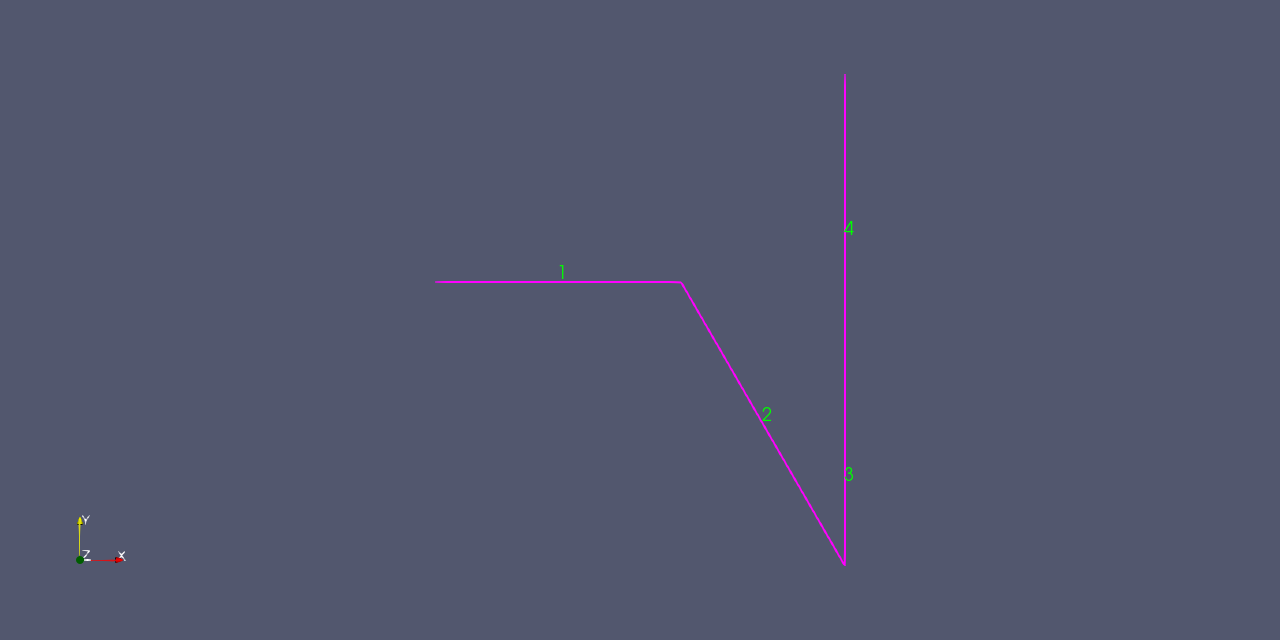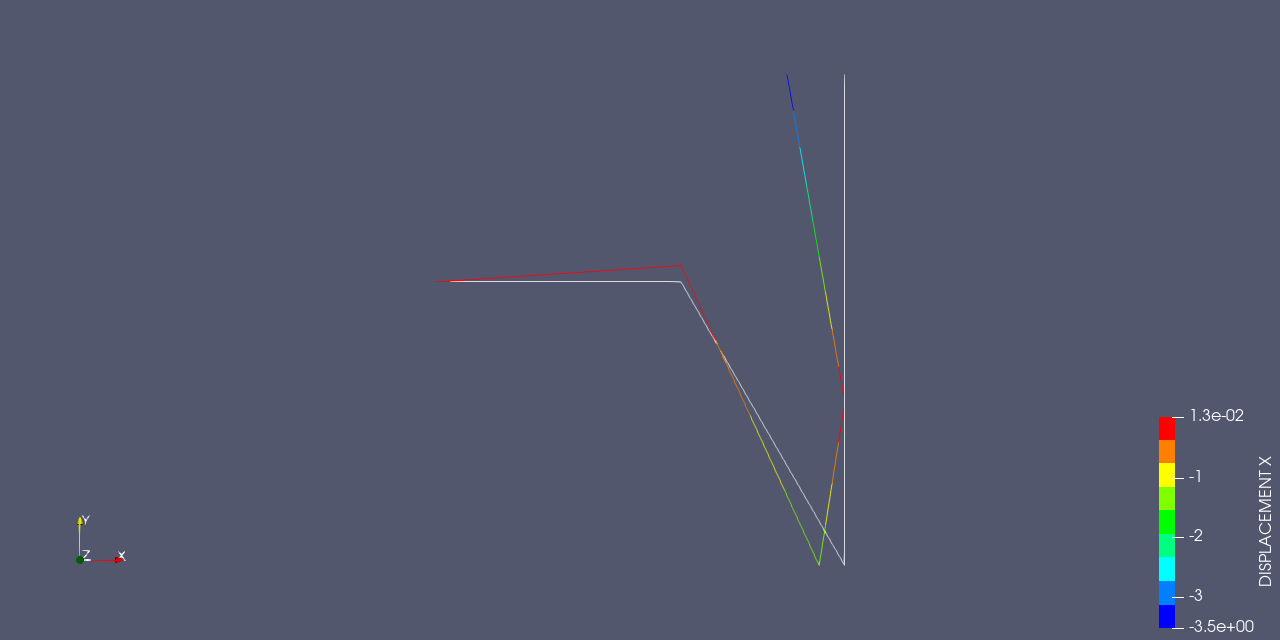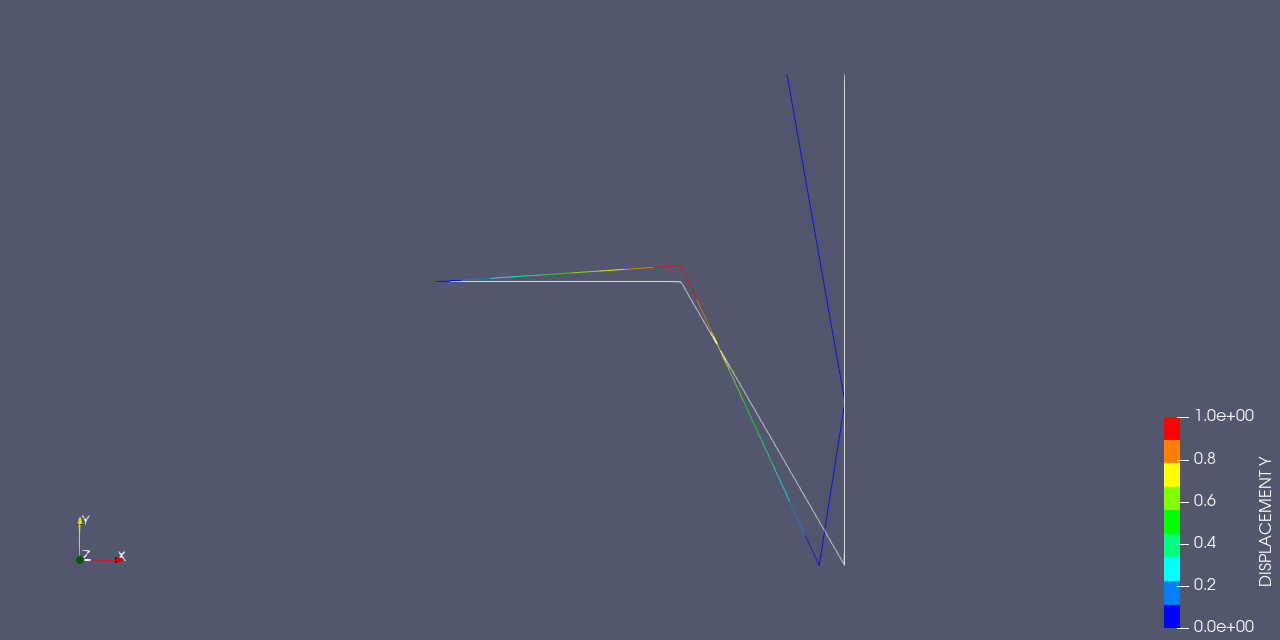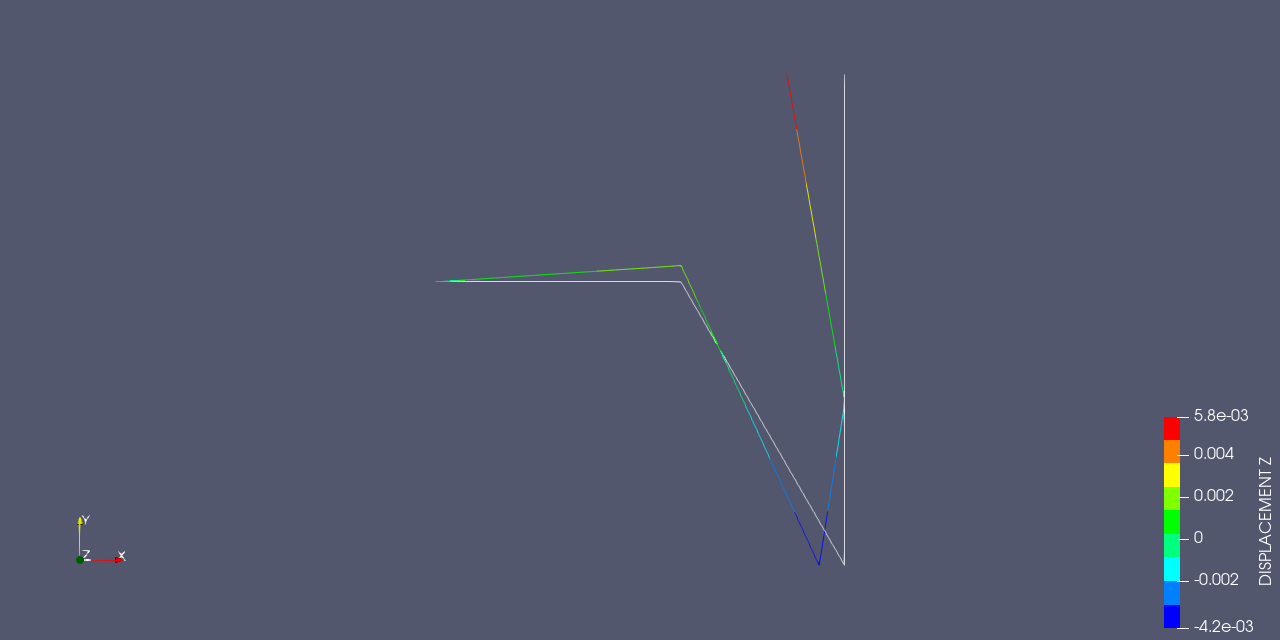Simple python script to calculate planar truss and beam structures based on the finite element approach derived from [1].
Three python scripts (./scripts/solver/pkgs) for solving the structural problem have been developed:
fem_classes.pyfem_functions.pyparse_input_file_linear_static.py
The main file to run the analysis is located in
./scripts/solver/solve_LinearStatic.py
The input file is created on text editor basis and is structured into following parts:
The nodal inputs are defined after using the *node keyword.
*node
node_id, x-coordinate, y-coordinate
There is no need to define the z-coordinate due to the planar analysis type.
The element inputs are defined after using the *element keyword.
- Rod element types are defined as followed:
*element, type=rod
element_id, first_node_id, second_node_id
- Beam element types are defined as followed:
*element, type=beam
element_id, first_node_id, second_node_id
The element property inputs are defined after using the *property keyword.
- Rod properties are defined as followed:
*property rod
first_element_id, last_element_id, E, A
- Beam properties are defined as followed:
*property beam
first_element_id, last_element_id, E, A, I, h_max
With
E : Modulus of elasticity
A : Cross section
I : Area moment of interia
h_max : Distance from the neutral axis to the top and bottom of the cross section (for the strain and stress calctulation)
The load inputs are defined after using the *load keyword.
*load
node_id, local_degree_of_freedom, value
The constraints inputs are defined after using the *boundary keyword.
*boundary
node_id, first_local_degree_of_freedom, last__local_degree_of_freedom, value
A fixed dof has a value of 0. Enforced displacements are also defined within the constraints definition with a value not equal 0.
The example input file ws_11_12.txt can be found in the ./examples/truss_beam_test/ws_11_12 directory.
*node
1,0.,0.
2,750.,0
3,1250.,-866.0254
4,1250.,-366.0254
5,1250.,633.9746
*element, type=rod
2,2,3
*element, type=beam
1,1,2
3,3,4
4,4,5
*property rod
2,2,30000.,20.
*property beam
1,1,30000.,40.,16000.,5
3,4,30000.,50.,25000.,5
*load
5,1,-10.
*boundary
1,1,3,0.
2,2,2,1.
4,1,1,0.
4,2,2,0.
To visualize the finite element model defined by the input file the txt2vtk.py python script can be used which is
stored in the ./scripts directory. This python script converts the *node and *element
block into a VTK file which can be opened/visualized with the open-source multiple-platform application ParaView.
The script creates a NODE.vtu and a ELEMENT.vtu file. The NODE.vtu can be used to visualize
the nodal points.
The ELEMENTS.vtu can be used to visualze the defined elements.
Further the element type can be visualzed with the ELEMENTS.vtu file.
To solve the FE model input use the solve_LinearStatic.py file in ./scripts/sovler.
The script will write out some basic information into the terminal screen (e.g. for ws_11_12.txt):
[INF] Run Linear Static Solver (Version 1.0.0)
[INF] Parsing input file: ./input_files/truss_beam_test/ws_11_12/ws_11_12.txt
Number of nodes: 5
Number of elements: 4
Number of SPCs: 4
Number of loads: 1
[INF] Element properties (Element type, eid, n1, n2, length, rotation angle, E, A, I)
Beam, 1, 1, 2, 750.00, 0.00, 30000.0, 40.0, 16000.0
Rod, 2, 2, 3, 1000.00, 300.00, 30000.0, 20.0
Beam, 3, 3, 4, 500.00, 90.00, 30000.0, 50.0, 25000.0
Beam, 4, 4, 5, 1000.00, 90.00, 30000.0, 50.0, 25000.0
[INF] SPCs (nid, first DOF, last DOF, value)
1, 1, 3, 0.0
2, 2, 2, 1.0
4, 1, 1, 0.0
4, 2, 2, 0.0
[INF] Loads (nid, DOF, value)
5, 1, -10.0
[INF] Map nodal local DOF to global DOF
Nodal DOF mapping: {1: [1, 2, 3], 2: [4, 5, 6], 3: [7, 8, 9], 4: [10, 11, 12], 5: [13, 14, 15]}
Element DOF mapping: {1: [1, 2, 3, 4, 5, 6], 2: [4, 5, 7, 8], 3: [7, 8, 9, 10, 11, 12], 4: [10, 11, 12, 13, 14, 15]}
[INF] Assemble global stiffness matrix K
Global stiffness matrix size: (15, 15)
[INF] Solve linear system of equations K * u = f
[INF] Post process results
[INF] Write FE results to file
Results written to ./input_files/truss_beam_test/ws_11_12/
Done.
Two output files will be created. A .out were the reults will be
summarized in a text file and a .h5 were the nodal and elemental
results are stored. The .h5 file format is also known as the Hierarchical Data Format version 5, and it is saved
as a binary file.
As an example the output file ws_11_12.out is shown below:
R e s u l t s
Linear Static Analysis for Planar Truss and Beam Structures
Input file: ws_11_12.out
S u m m a r y F E M o d e l S i z e
Number of Nodes 5
Number of Elements 4
incl. Rods 1
incl. Beams 3
Total Number of DOFs 15
Number of SPCs 4
Number of Loads 1
N o d a l D i s p l a c e m e n t s
nid u_x u_y u_R
1 0.0000e+00 0.0000e+00 0.0000e+00
2 1.2500e-02 1.0000e+00 2.0000e-03
3 -1.5662e+00 1.1547e-02 -4.2435e-03
4 0.0000e+00 0.0000e+00 -9.1021e-04
5 -3.5342e+00 2.1600e-16 5.7565e-03
N o d a l R e a c t i o n F o r c e s
nid RF_x RF_y RM
1 -2.0000e+01 -3.4133e+00 -2.5600e+03
2 -2.1316e-14 3.8054e+01 0.0000e+00
3 1.4211e-14 4.9738e-14 9.0949e-13
4 3.0000e+01 -3.4641e+01 2.7265e-12
5 -1.0000e+01 5.7332e-29 1.8151e-12
E l e m e n t a l S t r a i n s
eid Pt. 1 Pt. 2
1 3.0000e-05 3.3333e-06
2 6.6667e-05 6.6667e-05
3 1.0239e-05 -5.6427e-05
4 3.3333e-05 -3.3333e-05
E l e m e n t a l S t r e s s e s
eid Pt. 1 Pt. 2
1 9.0000e-01 1.0000e-01
2 2.0000e+00 2.0000e+00
3 3.0718e-01 -1.6928e+00
4 1.0000e+00 -1.0000e+00
E n d o f R e s u l t s
To visualize the FE results the vtkpost.py python script can be used which is
stored in the ./scripts directory. The stored results from the .h5 file will be
mapped to the ELEMENTS.vtu file.
- Displacement X,Y and Z (here it's the rotation around the Z-Axis) direction results
The deformed scale factor (warp by vector) is set to 50.
- Stress values at point 1 (top surface of the cross section):
The nodal reaction loads as well as the elemental strains can be visualized.
The FE results calculated with the python code (see files in./examples/input_files) have been tested and verified. The FE models for the truss and beam strucutres and their results for verification are taken from [2].
The visualization of the loads and boundary conditions are yet not
implemented in txt2vtk.py but will be provided in a later version.
[1] Finite Element Method Lecture Notes, Frankfurt University of Applied Sciences
[2] Öchsner, Andreas & Öchsner, Marco. (2018). A First Introduction to the Finite Element Analysis Program MSC Marc/Mentat. 10.1007/978-3-319-71915-3.






